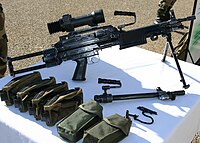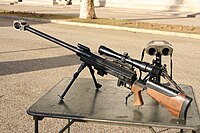Unit GROM
|
Jednostka Wojskowa Grom |
|
|---|---|
 Association badge of the GROM unit |
|
| Lineup | July 13, 1990 |
| Country |
|
| Armed forces | Polish armed forces |
| Armed forces | Polish special forces |
| Branch of service | Special forces |
| Type | Combat troop |
| Strength | 650 (2014) |
| Insinuation | Command of Polish Special Forces |
| Deployment locations | HQ Warsaw , Gdansk |
| motto | Siła i Honor Tobie Ojczyzno! ("Strength and honor to you fatherland!") |
| management | |
| commander | Colonel Mariusz Pawluk |
| Important commanders |
|
| insignia | |
| Special forces flag |
|
The GROM unit ( Polish: Jednostka Wojskowa Grom , Jednostka Wojskowa 2305 ) is a military unit for special operations by the Polish armed forces. The association is comparable to the special forces command of the German Armed Forces or the special forces of the US armed forces .
Naming and origin
The four letters GROM officially stand for "Grupa Reagowania Operacyjno-Manewrowego" (de: Group of Operative Maneuvering Reaction) and literally mean thunder .
The special unit was set up in 1990 under the leadership of Lieutenant Colonel Sławomir Petelicki . It belongs to the partial armed forces (TSK) special forces , but is also recruited from suitable soldiers of the other TSK.
history
precursor
In the early 1970s and 1980s there were a few special forces in the Polish People's Army , although they were mainly trained in pure military tactics (such as sabotage, interruption of enemy communications, etc.) or mainly in counter-terrorism.
After the Polish Embassy in Bern was occupied by militant members of the Polish Revolutionary Home Army in 1982 (see Occupation of the Polish Embassy in Bern ), the Polish General Edwin Rozłubirski proposed a secret unit to the army leadership to defend against and combat terrorist and other unconventional dangers to reform. However, Rozłubirski's proposal met with rejection within the leadership of the Polish People's Army .
It was not until 1990 that there was renewed discussion after two Polish diplomats were shot in Beirut. The Polish government then dispatched a command under the command of Lieutenant Colonel Sławomir Petelicki to ensure the security of the Polish embassy.
Lineup

After his return to Poland, Petelicki presented his idea of a military special unit to the Polish Ministry of Defense , which should be specially trained abroad for special operations to protect Polish citizens in order to better deal with future dangerous situations such as those in Lebanon.
Petelicki's ideas were welcomed by the Ministry of the Interior, so that on July 8 of the same year the unit with the internal name JW 2305 (de: Military Unit 2305) was launched.
The JW 2305 was directly subordinate to the Polish Minister of Defense from 1999 to 2007 . The home barracks are located in Rembertów , an eastern part of Warsaw . The management structure is closely based on that of the British Special Air Service (SAS) and the US Delta Force , which made a not insignificant contribution to the training of the first unit members. Since it was set up, the unit has consisted of professional soldiers without exception.
Publicly known incidents
On May 13, 2002, a soldier from the unit died during a maneuver in Gdańsk Bay. Due to a sudden change in weather, he drifted into the open sea after a parachute jump near the coast. Rescue teams were not on the spot in time and were only able to recover the soldier's body. It was the first soldier to be killed while on duty. On January 23, 2013, the first JW Grom soldier was killed in action in Ghazni Province .
Publicly known missions
- 1994 - Operation Uphold Democracy in Haiti - together with the 3rd Special Forces Group of the United States Army Special Forces Command (Airborne)
- 1997 - Operations in the former Yugoslavia , arrest of the Serbian war criminal Slavko Dokmanović
- 1999 - Protection of UN Secretary General Boutros Boutros-Ghali
- Since 2001 - Operation Enduring Freedom
- Since 2001 - war in Afghanistan
- 2003 to 2008 - Operation Iraqi Freedom , including the battle for Umm Qasr
assignment
- CT (eng. Counterterrorism ) - anti-terrorism, i.e. the actual fight against and destruction of terrorists. The term encompasses both an immediate military response to terrorist threats and operations in which police forces would be overwhelmed (example: occupation of the Iranian embassy in London in 1980 - Operation Nimrod). This includes the release of hostages.
- PR ( Personal Recovery ) - Combat Search and Rescue as well as the evacuation of embassy personnel from threatening situations.
- SR ( Eng.Special Reconnaissance ) - remote reconnaissance, as information gathering in the Deep Combat Zone about the location and direction of enemy formations and their armament as well as on-site evaluation of the effect of own artillery and air attacks.
- DA (Eng. Direct Action ) - direct command operations by coup d'état or ambush, in particular to combat key targets such as command centers, air force bases, war ports, telecommunication facilities or central energy supply facilities.
- MS (Eng. Military Support ) - military support, training of allied and own units in peacetime. Assistance and advice to allies in war and crisis situations.
- UW (eng. Unconventional Warfare ) - unconventional warfare, for example breakthroughs to own trapped units and guerrilla warfare.
- CSAR (Eng. Combat Search and Rescue ) - implementation of rescue operations of downed aircraft crews and other military and civilian persons in the enemy area.
organization
The GROM consists of around 300 professional soldiers, including some women in the negotiating group. Precise information on manpower and organizational structures are subject to military secrecy . It is known, however, that a task force usually consists of four soldiers, each of whom can take on two special tasks.
Commanders Jednostka Wojskowa Grom
| No. | Rank, name | period of service | comment |
|---|---|---|---|
| 14th | Colonel Mariusz Pawluk | Since March 14, 2017 | |
| 13 | Colonel Robert Kopacki | September 8, 2016 to March 14, 2017 | |
| 12 | Colonel Piotr Gąstał | July 28, 2011 to September 7, 2016 | |
| 11 | Colonel Jerzy Good | August 6, 2010 to July 28, 2011 | |
| 10 | Colonel Dariusz Zawadka | July 24, 2008 to August 6, 2010 | |
| 9 | Colonel Jerzy Good | March 25, 2008 to July 24, 2008 | |
| 8th | Colonel Piotr Patalong | November 8, 2006 to March 25, 2008 | later commander of the Polish Special Forces |
| 7th | Brigadier General Roman Polko | February 23, 2006 to November 8, 2006 | later division general |
| 6th | Colonel Tadeusz Sapierzyński | February 11, 2004 to February 23, 2006 | |
| 5 | Colonel Roman Polko | May 26, 2000 to February 11, 2004 | |
| 4th | Colonel Zdzisław Żurawski | September 17, 1999 to May 26, 2000 | |
| 3 | Brigadier General Sławomir Petelicki | December 7, 1997 to September 17, 1999 | † June 16, 2012 |
| 2 | Brigadier General Marian Sowiński | December 19, 1995 to December 6, 1997 | |
| 1 | Lieutenant Colonel Sławomir Petelicki | July 13, 1990 to December 19, 1995 |
Recruitment and training
The acceptance requirements of GROM are primarily based on those of the British SAS. Before applying for membership, every applicant must be aware that they will not take part in a one-off competition, but will go through several years of extremely demanding and dangerous training and take part in combat missions.
Since recruitment began in 1990, applicants have mainly come from among the other paratroopers and special forces in the Polish armed forces. These are the 1 Samodzielny Batalion Szturmowy (now Jednostka Wojskowa Komandosów ) from Lubliniec (de: 1st Autonomous Storm Battalion), the 6 Brygada Powietrznodesantowa (de: 6th Airborne Brigade) from Kraków and others. In addition to candidates from the Policja or Straż Graniczna special forces , civilians etc. a. with a university degree admitted to the application.
At the beginning of the recruitment process, each candidate must submit a letter of motivation. Out of the 300 to 400 applications submitted annually, only a few applicants are invited to psychological and physical tests. These consist, among other things, of a 100 m sprint and a 3000 m run, swimming and diving exercises, orientation tests and a so-called forced march over several days with up to 40 kg of luggage (comparable to the final examination of the KSK in the so-called hell week) on the test program as well as numerous other physical stress tests.
In the further course of the training, special emphasis is placed on combat and shooting training, in which only live ammunition is used.
equipment
Handguns
Submachine guns
Assault rifles
Machine guns
Sniper rifles
- H&K PSG1 sniper rifle
- KAC SR-25
- PGM Précision 338
- PGM Hécate II (heavy precision rifle in 12.7 × 99 mm NATO caliber )
- AWM .338 LM
- M107
Grenade launcher
Shotguns
- M870 Remington , a version of the Remington 870
Hand grenades
Military tradition
The Grom continues the military tradition of the Cichociemni , a secret Polish paratrooper unit that operated in occupied Poland during the Second World War , carried out numerous attacks on Gestapo and SS officers and was involved in the Warsaw Uprising .
After the establishment of the GROM, all former members of the Cichociemni received honorary combatant status in the newly founded unit. In the barracks area in Warsaw - Rembertów there is a memorial and documentation room in which the personal equipment of members of the Cichociemni is exhibited.
Partnerships with foreign special forces
-
 United Kingdom - Special Air Service
United Kingdom - Special Air Service
-
 Israel - Sajeret Matkal
Israel - Sajeret Matkal
-
 United States - Navy Seals
United States - Navy Seals
-
 United States - US Army SF
United States - US Army SF
-
 United States - 1st SFODD
United States - 1st SFODD
literature
- Sören Sünkler: Europe's elite and special units. Motorbuch Verlag, Stuttgart 2008, ISBN 3-613-02853-0 .
- Hubert Królikowski: Wojskowa Formacja Specjalna GROM im. Cichociemnych Spadochroniarzy Armii Krajowej. Gdański Dom Wydawniczy, Gdańsk 2002, ISBN 83-909622-3-3 .
See also
Individual evidence
- ^ Charles Beckwith: Delta Force: The Army's Elite Counterterrorist Unit. Avon Books, New York 2000, ISBN 0-380-80939-7 .
Web links
- GROM at specwarnet.net (English)
- Official Homepage (Polish)
- Unofficial Homepage (Polish)
- Grom (Polish)
- ShadowSpear Special Operations (English)
- The GROM factor (English)




